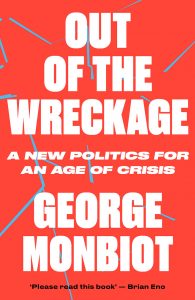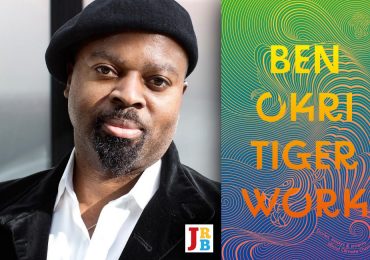British author and noted environmentalist George Monbiot took The JRB’s questions on his new book, Out of the Wreckage: A New Politics for an Age of Crisis, which aims to point the way toward a world that’s a more just, inclusive and greener place.
 Out of the Wreckage: A New Politics for an Age of Crisis
Out of the Wreckage: A New Politics for an Age of Crisis
George Monbiot
Verso, 2018
Ben Williams for The JRB: Out of the Wreckage is a refreshing read, in that one of its messages is ‘not all hope is lost’—optimism whose wide adoption seems essential to the survival of our planet. In your experience, what’s the best method of maintaining and spreading this optimism, in our current age of industrial psy-ops, represented by think-tanks’ astroturfing and the reinforcing, iterative power of fake news? How best do you get the word out, when the communication platforms we have at our disposal are so thoroughly tainted?
George Monbiot: This is a crucial question, that should animate everyone who seeks a better world. My hope, when the social media revolution began, was that we could escape the power of the oligarchs who control the mass media. But they soon found new ways of guiding our perceptions on social media. In some respects, these methods are more powerful and more pernicious than the influence of the mainstream media, largely because we have few means of discovering the extent to which our opinions are manipulated.
There has been a comprehensive failure of due diligence both on the part of providers (Facebook and Google being obvious examples) and on the part of the established media, who amplify rather than challenge hidden persuasion by powerful commercial interests. This applies even to public service broadcasters, around the world. Repeatedly, they provide a platform for organisations that call themselves think-tanks, but in reality are covertly funded lobby groups, working for corporations or billionaires. They do so without requiring that such groups reveal their sources of funding.
Resisting and replacing these tainted sources is crucial to any benign transformation of our lives. To me, this challenge reinforces the need to rebuild genuine community: geographical community, political community, communities of interest. It remains the case that the most powerful medium on earth, despite technological advances, is word-of-mouth. And this is the only medium over which we have, in principle, complete control. So we must come out from behind our social media accounts and engage directly. But we can also use the few untainted outlets more intelligently to spread our message. And there are some quite promising new developments, such as the Solid project being developed by Tim Berners-Lee.
The JRB: You quote Ben Okri at the beginning of your book, for the epigraph: ‘Nations and peoples are largely the stories they feed themselves. If they tell themselves stories that are lies, they will suffer the future consequences of those lies. If they tell themselves stories that face their own truths, they will free their histories for future flowerings’ (from A Way of Being Free). Are you a fan of Okri’s?
George Monbiot: I think he is a magnificent writer, one of the great contemporary masters of the written word. By wonderful coincidence, I shared a platform with him at a literary event just as I was finishing Out of the Wreckage. He read one of his essays, that chimed precisely with what I was saying. The paragraph it contained, which I used as my epigraph, perfectly summarised the theme of the book.
The JRB: Your book’s main thesis is that human beings are creatures who need to be social and whose ingrained altruism sets us apart as a species, and thus that a political narrative with ‘belonging’ at its heart is likely to have success in replacing neoliberalism’s destructive cult of the individual. In South Africa, belonging is built into our culture: a phrase that expresses this is ‘motho ke motho ka batho babang’—’a person is a person because of other people’. But we have the second-highest (read: second-worst) Gini coefficient in the world, meaning that exclusion is built into the fabric of our society. What narrative can societies which have ‘belonging’ already high on their list of values turn to, to fight neoliberalism’s structural depredations?
George Monbiot: This is an excellent point, which demonstrates that while belonging is a necessary condition for social transformation, it is not sufficient. This is why, throughout the book, I have proposed concrete political and economic reforms to counter exclusion and inequality and build the good society almost everyone wants to see. But the point is that to make such reforms effective, we need to embed them within a narrative that resonates. For this reason, societies that strongly value belonging could be fertile seedbeds for such positive change. The crucial task is to turn political reform into a story that explains who we are, how we got here and where we need to go. ‘Motho ke motho ka batho babang’ is the first sentence of this story. But it is not the last.
The JRB: Further, the political trend in South Africa is not toward extreme individualism, but toward a kind of paternalist/populist/progressive statism (depending on the party you favour), which can be found in other parts of the developing world. Do you see statism as being on the same spectrum of ills as those you diagnose in the neoliberalism-addled West?
George Monbiot: I think one of the traps into which we have fallen is to define ourselves politically along a single spectrum, with market at one end and state at the other. If you are on the right, you want more market and less state, and if you are on the left you want more state and less market. But there are in fact four principal economic sectors: market, state, household and commons. Our neglect of the latter two, which in my view should be the most important of the four, shuts down many of the options we could deploy. The commons in particular—defined as resources controlled by particular communities, which cannot be sold or given away, and whose use or products are shared on an equal basis by all members of the community—offer some excellent options for social transformation, that neither the state nor the market can provide.
The JRB: You mention the ‘Pollution Paradox’, in which the most environmentally destructive industries spend the most money on politics in order to buy paths to ongoing viability. In South Africa, this is coupled with what might be called the ‘Equality Paradox’, which sees the most environmentally destructive industries—mining, state-owned (and coal-fuelled) power companies, and so forth—held up as the keys to our economic salvation, because of their ability to create jobs and drive growth. How do we wriggle out of this paradox? That is, how are developing economies meant to achieve economic equality without growth?
George Monbiot: Growth in some sectors is far more likely to generate wellbeing than growth in other sectors. Contrast, for example, coltan mining in the DRC with the rapid development of universal health provision in Kenya. As coltan mining grows, it spreads slavery, conflict, dispossession and environmental destruction. As the Kenyan health service grows, it spreads security, prosperity and longevity. This is why GDP is such a perverse metric for wellbeing. It makes no distinction between harmful and beneficial growth. We urgently need new metrics, which seek to measure not a perverse proxy for prosperity, like growth, but wellbeing itself. We would quickly discover that many of the forms of growth that are supposed to enhance wellbeing do the opposite, while many beneficial changes are currently neglected.
The JRB: Would your new politics of belonging require a new world political movement as its vehicle? Or can existing movements or organisations be ‘captured’ or otherwise swayed to adopt this new politics?
George Monbiot: One of the points I try to make in the book is that our existing political units may not be well matched to the challenges we face. We act as if the nation state is and has always been the fundamental and indispensable political unit. But it is a remarkably recent invention, not just in Africa, but also in Europe. It discharges some functions well, but it is an impediment to others: think of the way in which attempts by nation states to shed responsibility has impeded action on climate breakdown.
I believe we need to think beyond national democracy. To seek reform at both ends of the size spectrum: looking both at the potential offered by radical devolution, permitting a flowering of local democracy and responsibility, and at international democracy. Of course, no polity at any scale is immune to capture and corruption. Changing the scale of politics does not necessarily change the potential for subversion. So the same means of vigilance and accountability required at the national level must be deployed at other levels.
The JRB: At one point you call for a ‘directly elected world parliament’, which seems unlikely. What about finding a way to ‘hack’ the United Nations and other already established world bodies instead?
George Monbiot: It is unlikely, but so is all radical change, at its inception. At the moment, at the global level, we have governance without democracy. Global organisations, such as the UN Security Council, the World Bank and the IMF, wield tremendous power, but cannot be held to account by those over whom they exercise this power. Hacking the United Nations is perhaps the most unlikely change of all, as the five permanent members of the Security Council can individually veto any change at any level, even if all the other members of the General Assembly support it. It is an inherently undemocratic—in fact anti-democratic—organisation. This is why I believe it requires external counterweights, such as a world parliament, rather than, or as well as, internal reform, which seems to me even less likely.
The JRB: In the past, you’ve advanced a somewhat controversial opinion (for environmentalists) on nuclear power. The Swedish author Henning Mankell, who spent a lot of time in southern Africa, wrote in his final book, the memoir Quicksand, about how he was astonished that the human race could countenance even the idea of nuclear waste, which only becomes safe to handle after approximately 3000 generations. (He was referring specifically to the waste meant to be buried in Swedish caves: how would his 1000th-generation descendants handle it? How would they even know what it was?) Are you still a nuclear power optimist, for want of a better term?
George Monbiot: Of course it is true that nuclear waste has a very long toxic legacy, but so does the burning of fossil fuels, and this legacy is likely to be far more profound: namely the complete transformation of life on Earth and—if previous episodes of rapid warming are anything to go by—the elimination of most of it. It seems crazy to me that in the midst of a climate emergency, countries like Germany and Japan should shut down their largest sources of low carbon electricity.
The nuclear power industry has been phenomenally irresponsible, generating waste before developing any reasonable means of handling it. I’m not quite sure what disposal method Henning Mankell had in mind, but in Scandinavia the most advanced option for burial, developed in Finland, would put nuclear wastes so far out of reach that only a highly advanced civilisation could recover it. You couldn’t stumble across it, down a 10,000 foot hole, backfilled with concrete and bentonite, by accident: encountering it would require a determined, expensive and long-lasting effort. If you are capable of making this effort, you would be capable of determining why you would wish to do so.
However, we can avert even this highly unlikely scenario by treating the byproducts of current nuclear power not as waste but as energy sources. Typically, only one to two per cent of the energy embedded in nuclear materials is used in current nuclear power stations. Certain designs of small modular reactors (such as the IFR) could use the great majority that remains in what we now designate as waste. In Britain, the late great physicist David MacKay estimated that the nuclear waste we have accumulated so far could provide five hundred years of low-carbon energy. In doing so, a new generation of reactors would consume this waste, reducing it to a tiny fraction of the current pile, with much faster decay times. In other words, no long-lasting legacy. Is this not a rational approach to the problem?
The JRB: Do the recent outcomes of COP 24-Katowice give you much cause for hope?
George Monbiot: No.
The JRB: How would you describe yourself, as a thinker? To what tradition of thought would you say you ultimately belong?
George Monbiot: That’s a good question, and I have no easy answer. The environmental crisis demands an entirely new ethical and philosophical course, and the philosophers to whom we might look for guidance have little to teach us on this issue. Much of what they regarded as good and wholesome has consequences they could not have anticipated. In my view, the best guide to the new thinking we might require is Jeremy Lent’s astonishing book The Patterning Instinct. It helps to explain how we acquired our current world views, and how we might shift them.
The JRB: Where in your personal timeline did this book have its genesis? Before or after your cancer diagnosis? If after, did your experience alter the final form of the book?
George Monbiot: It was conceived and written before my diagnosis. I had no idea at the time that I was ill. I don’t think my approach would have changed much, had I known.
The JRB: Similarly, how much of the book was influenced by the Brexit vote?
George Monbiot: Because Brexit directly affects only one nation, I sought not to let it influence me too much, in writing a book whose reach is intended to be international. But Brexit is a good illustration of the way in which the neglect of crucial political and economic issues does not make them go away, but ensures they surface in different and unexpected forms. I also look at the way in which we can develop forms of participatory democracy that don’t rely on presenting vast and crude questions to a poorly informed electorate, but create continuous opportunities for political change, above and beyond our occasional elections. Brexit represented the worst possible abuse of participatory democracy. But this does not mean the principal is flawed. We urgently need to temper representative democracy with more direct forms, to replace presumed consent with actual consent.
The JRB: I’m tempted to give the book a second subtitle, ‘The Commons Manifesto’, because of the centrality of restoring and expanding public wealth as part of any realistic plan to stem environmental destruction. What are some of your favourite commons spaces, which you’ve visited over the years?
George Monbiot: That would be quite an accurate subtitle. I was strongly influenced as a young man by the peasant movements I worked with in north-eastern Brazil, who hold their land and their other means of production in common. This political economy created a tremendously powerful social solidarity, which allowed illiterate and marginalised people to confront the combined forces of state and capital and, in some cases, to win. More recently, I’ve been looking at contemporary, urban examples, such as platform cooperatives on the European continent, and the remarkable transformation of London’s poorest borough by a project called Every One Every Day, that has gradually been turning both private and state resources into common resources.
The JRB: Finally, tell us a bit about your album, Breaking the Spell of Loneliness?
George Monbiot: It was the research I conducted for this album that inspired Out of the Wreckage. I had written an article for the Guardian about the age of loneliness, that went viral, and several publishers asked me to write books on the same theme. But I could think of nothing more miserable than sitting on my backside for three years writing about loneliness. Writing and reading, though there is much to recommend them, are essentially solitary. So instead, I teamed up with a musician I greatly admire, Ewan McLennan, to use the most social of all media to address this issue. We toured the album all over Britain, more or less forced people to sing together, and then to talk to each other, and turned every gig into a party afterwards. It worked amazingly well. It taught me that, despite our famous British shyness and reserve, all we need to start engaging with strangers is social permission.





